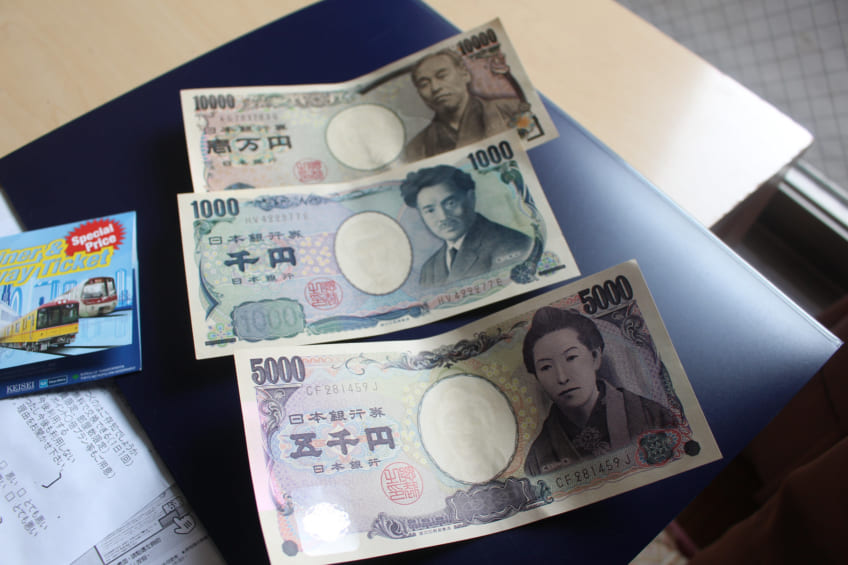 The majority of Japanese households are still relying on physical money than e-money. (Image via Taiken Japan)
The majority of Japanese households are still relying on physical money than e-money. (Image via Taiken Japan)
Japanese people still rely on cash despite e-money availability
While the world has started to rely on e-money, Japan still cannot get rid of its “cash is king” mentality. Japan may have invented the technology that other countries use to make the cashless transaction and digital wallet come true.However, Japan does not rely on that much yet despite its goal of becoming one of the cashless nations by 2027 because its people still prefer physical money.
On a survey published on Monday, almost one of five Japanese households use e-money when it comes to trivial purchases. Participating in the survey from June – July 2019, 18.5 percent of the Japanese households use e-money from their digital wallet to purchase items up to ¥1,000 are spent.
The percentage went up more than 2018’s rate at 15.4 percent.
Single-person households, 43 percent of them are in their 20s and 30s, about 35.6 percent of the households are using digital payment. It proves that the efforts to lead the Japanese households to cashless culture start to bear their fruits and the cash-hoarding culture is slowly changing.
However, the bad news is, about 84 percent of Japanese households are still using cash and coins for their daily purchases. For purchase exceeding ¥10,000 - ¥50,000, 48.5 percent of the Japanese households use cash, and only 3.4 percent use digital payment.
Due to the low crime rate and the availability of automatic teller machines (ATMs) everywhere – more than 200,000 ATMs nationwide - the Japanese people, especially the elderly, have not realized the practicality of digital payment just yet. Some Japanese people also think that it is hard to keep track of your money with the digital wallet.
The Prime Minister of Japan, Shinzo Abe, has been struggling to shift cash culture to automate sales and to help banks cut the costly installation of ATMs. On 1 October, Abe officially imposed sales tax hike from 8 to 10 percent which can be rebated by e-money to up to five percent of the total cost for the purchase at smaller retails.
Japanese people’s trust for e-money once broke in July 2019, when 7Pay, a mobile payment by Seven & I Group, was hacked. Therefore, some Japanese economic analysts stated that security still needs to be improved. Some businesses are optimistic, however, that one day, Japan will embrace e-money wholly.
Source: https://bit.ly/2qu7Ysm
 English
English Japan
Japan

viagra cost per pill walmart prescription drugs without prior prescription taking viagra medicare drug price comparison kroger ph
adult 3d sex games androids adults only sex games free sex games online
how does cialis work cvs viagra samples cialis viagra cialis by mail mexico cialis 30 day coupon viagra without a doctor prescription risk natural viagra foods sildenafil 20 mg for ed women enhancement pills over the counter viagra and eye issues natural libido enhancer for men cheap viagra cortana windows 10 obtain a prescription online fda approved drugs list strongest viagra pill best weight loss supplements for women couponing at walgreens this week largest penile implant available viagra government funded best female libido enhancer on the market medicine to increase female libido daily cialis for bph viagra and vision problems natural viagra recipe are adhd drugs dangerous purchasing viagra in mexico most effective ed supplements teva generic sildenafil viagra pfizer gnc viagra substitute great value coupons walmart prescription cialis price comparison viagra jokes revatio 20 mg vs viagra best libido enhancers for women
vaseline samples for healthcare providers natural pde5 inhibitors viagra sans ordonnance cvs caremark member services viagra oral jelly reviews how quickly does viagra work
natural herbs for libido in women drug classifications made easy video of penile implant working doctor x viagra how much does viagra cost at cvs appetite suppressant amazon
medicare approved penile vacuum devices use of flomax in women snorting viagra alternatives for cialis or viagra eating before taking viagra the pink pill for women